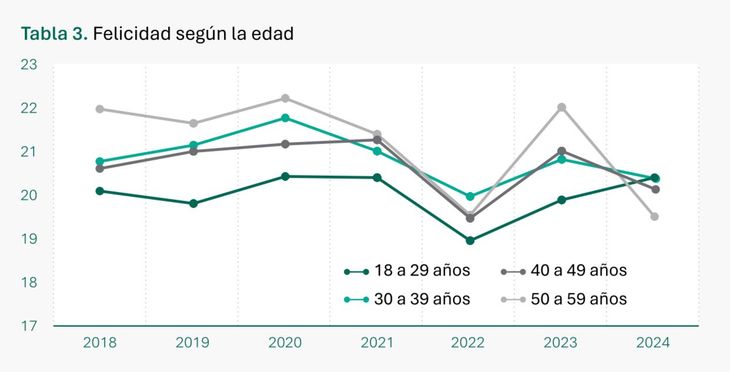In the first half of the year, the number of cases per work stress increased considerably: 1 in 3 Argentines feels so tired that they cannot do other activities after workwhile 24% of the population says that most days they feel they cannot relax after work and that it is increasingly difficult for them to start a new workday.
The data comes from the Insight 21 Trends Observatory which has been monitoring this problem since 2018. The Knowledge Hub of Universidad Siglo 21 identified an increase in stress levels and a decrease in happiness levels in 2024. This puts experts on alert since increases the likelihood of suffering from “burnout syndrome”.
“He socioeconomic context has a big impact. If one’s basic needs are not met, one is very likely to experience chronic and acute stress.” However, Luis Morera, director of the Observatory of Social Trends and one of the authors of the study clarifies that the relationship with money is not decisive, since it is a “multi-causal issue in which influence social, economic and personal variables, as social capital”.
This scenario raises concern because “burnout” is the prelude to more serious health pathologies both mental and physical such as Anxiety, depression and cardiovascular diseases. In addition, it decreases people’s ability to enjoy life outside the work environment, reporting less satisfaction in their personal relationships and a general feeling of discontent and lack of motivation.
What is burnout syndrome and how does it affect workers?
It is called “burnout” to the burnout syndrome or work fatigueWith alarming statistics showing that approximately 30% of employees are experiencing symptoms of burnout, the problem becomes a public and occupational health emergency.
Burnout.jpeg
Report shared by the Insight 21 Trends Observatory.
The main causes identified include long working hours, constant pressure to meet targets and lack of support in the work environment. This scenario not only affects the mental health of workers, but also negatively impacts the productivity and efficiency of organizations.
“Emotional well-being is crucial for the development of the population and, therefore, must be considered one of the priorities in both public and corporate policies. From an economic perspective, burnout and low happiness not only affect people’s quality of life and social cohesion, but also impact productivity,” he explained. Leonardo Medrano, Secretary General of Academia and Development of Universidad Siglo 21.
Morera also points out that another variable with a great impact on burnout levels is the relationship between resources and demand. “As long as the level of demand and resources is the same, one feels challenged and motivated. If the demands fall below my resources, I get bored. In the opposite situation, stress appears.”held.
Argentines are increasingly unhappy
The correlation between the increase in work stress and the decrease in happiness in Argentina is evident. In this regard, the general population shows a decrease in levels of well-being compared to 2023: Half of Argentines feel satisfied with their lives while 63.4% are dissatisfied with their current situation.
The surprising fact is that the young people between 18 and 29 years oldthe age group most susceptible to high stress, showed an increase in happiness levels in the first half of this year. While the Adults between 50 and 59 years old They showed a significant drop in that regard.
happiness index.jpeg

Happiness levels vary by age, as indicated in the report shared by the Insight 21 Trends Observatory.
However, researchers remain positive about Argentina’s results compared to other countries with disadvantaged economic conditions. Despite the “challenging” context, “if one analyses the correlation between socioeconomic factors and the level of happiness, in general we are a ‘favored’ country. The expected thing would be that we have lower levels than we have,” explained Medrano.
This is due to the “strong social capital”understanding that Argentines maintain on average “a greater number and quality of social relationships compared to other countries.” However, Medrano warns that factors such as political polarization or the weakening of the democratic system raise some concern as they could put this containment of happiness levels at risk.
Source: Ambito
I am an author and journalist who has worked in the entertainment industry for over a decade. I currently work as a news editor at a major news website, and my focus is on covering the latest trends in entertainment. I also write occasional pieces for other outlets, and have authored two books about the entertainment industry.




